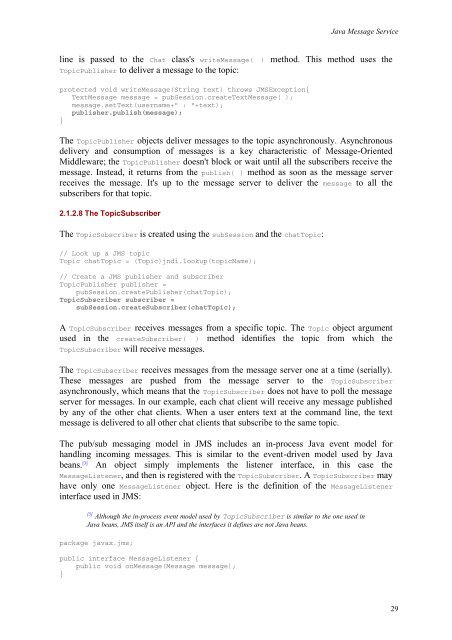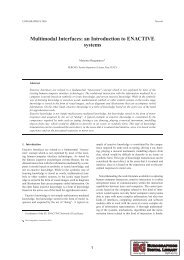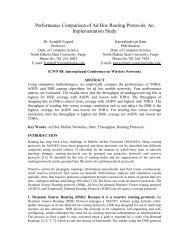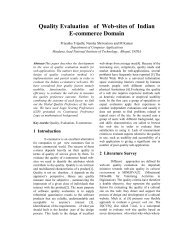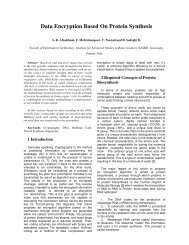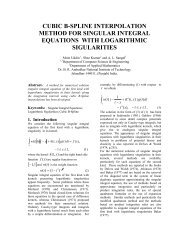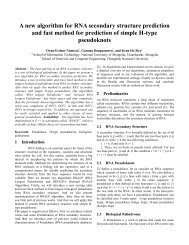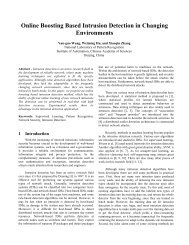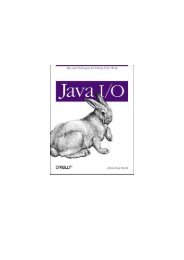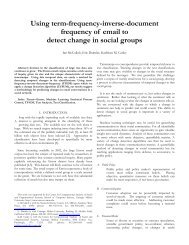O'Reilly - Java Message Service
O'Reilly - Java Message Service
O'Reilly - Java Message Service
Create successful ePaper yourself
Turn your PDF publications into a flip-book with our unique Google optimized e-Paper software.
<strong>Java</strong> <strong>Message</strong> <strong>Service</strong><br />
line is passed to the Chat class's write<strong>Message</strong>( ) method. This method uses the<br />
TopicPublisher to deliver a message to the topic:<br />
protected void write<strong>Message</strong>(String text) throws JMSException{<br />
Text<strong>Message</strong> message = pubSession.createText<strong>Message</strong>( );<br />
message.setText(username+" : "+text);<br />
publisher.publish(message);<br />
}<br />
The TopicPublisher objects deliver messages to the topic asynchronously. Asynchronous<br />
delivery and consumption of messages is a key characteristic of <strong>Message</strong>-Oriented<br />
Middleware; the TopicPublisher doesn't block or wait until all the subscribers receive the<br />
message. Instead, it returns from the publish( ) method as soon as the message server<br />
receives the message. It's up to the message server to deliver the message to all the<br />
subscribers for that topic.<br />
2.1.2.8 The TopicSubscriber<br />
The TopicSubscriber is created using the subSession and the chatTopic:<br />
// Look up a JMS topic<br />
Topic chatTopic = (Topic)jndi.lookup(topicName);<br />
// Create a JMS publisher and subscriber<br />
TopicPublisher publisher =<br />
pubSession.createPublisher(chatTopic);<br />
TopicSubscriber subscriber =<br />
subSession.createSubscriber(chatTopic);<br />
A TopicSubscriber receives messages from a specific topic. The Topic object argument<br />
used in the createSubscriber( ) method identifies the topic from which the<br />
TopicSubscriber will receive messages.<br />
The TopicSubscriber receives messages from the message server one at a time (serially).<br />
These messages are pushed from the message server to the TopicSubscriber<br />
asynchronously, which means that the TopicSubscriber does not have to poll the message<br />
server for messages. In our example, each chat client will receive any message published<br />
by any of the other chat clients. When a user enters text at the command line, the text<br />
message is delivered to all other chat clients that subscribe to the same topic.<br />
The pub/sub messaging model in JMS includes an in-process <strong>Java</strong> event model for<br />
handling incoming messages. This is similar to the event-driven model used by <strong>Java</strong><br />
beans. [3] An object simply implements the listener interface, in this case the<br />
<strong>Message</strong>Listener, and then is registered with the TopicSubscriber. A TopicSubscriber may<br />
have only one <strong>Message</strong>Listener object. Here is the definition of the <strong>Message</strong>Listener<br />
interface used in JMS:<br />
[3] Although the in-process event model used by TopicSubscriber is similar to the one used in<br />
<strong>Java</strong> beans, JMS itself is an API and the interfaces it defines are not <strong>Java</strong> beans.<br />
package javax.jms;<br />
public interface <strong>Message</strong>Listener {<br />
public void on<strong>Message</strong>(<strong>Message</strong> message);<br />
}<br />
29


